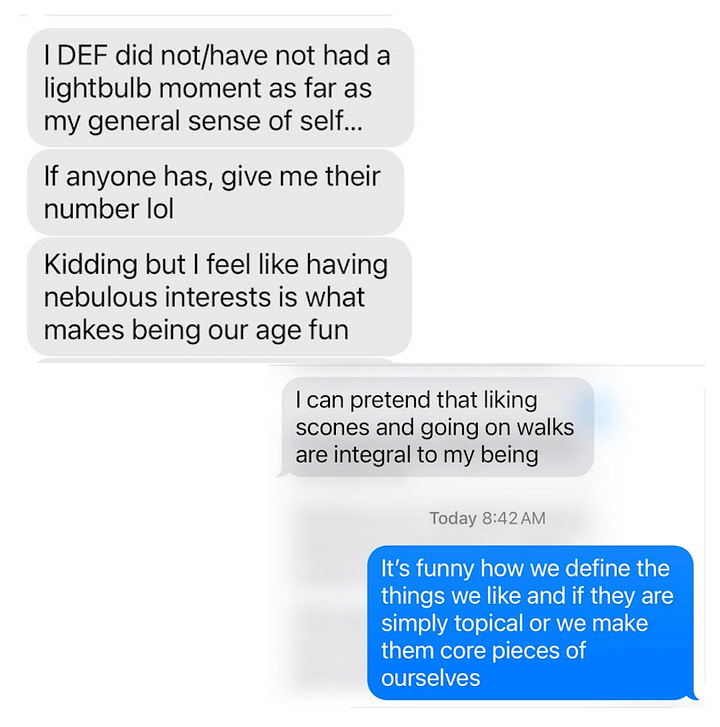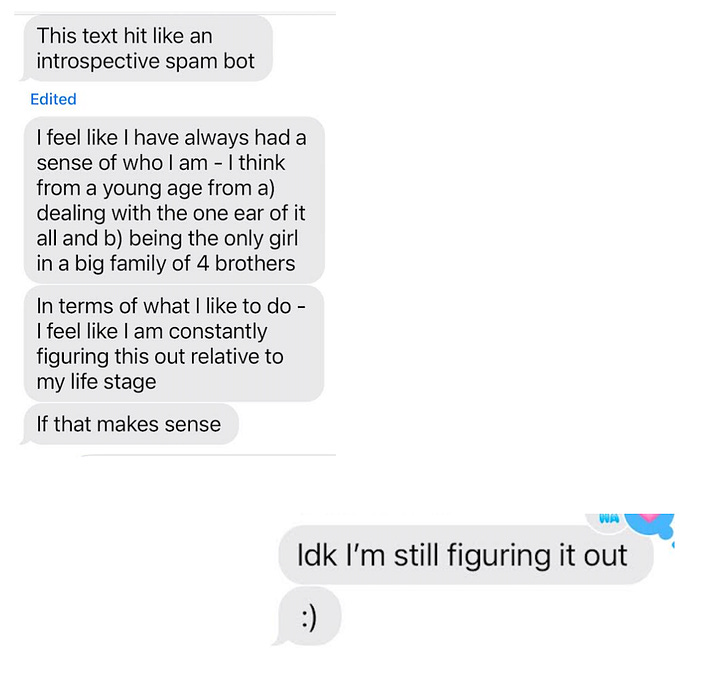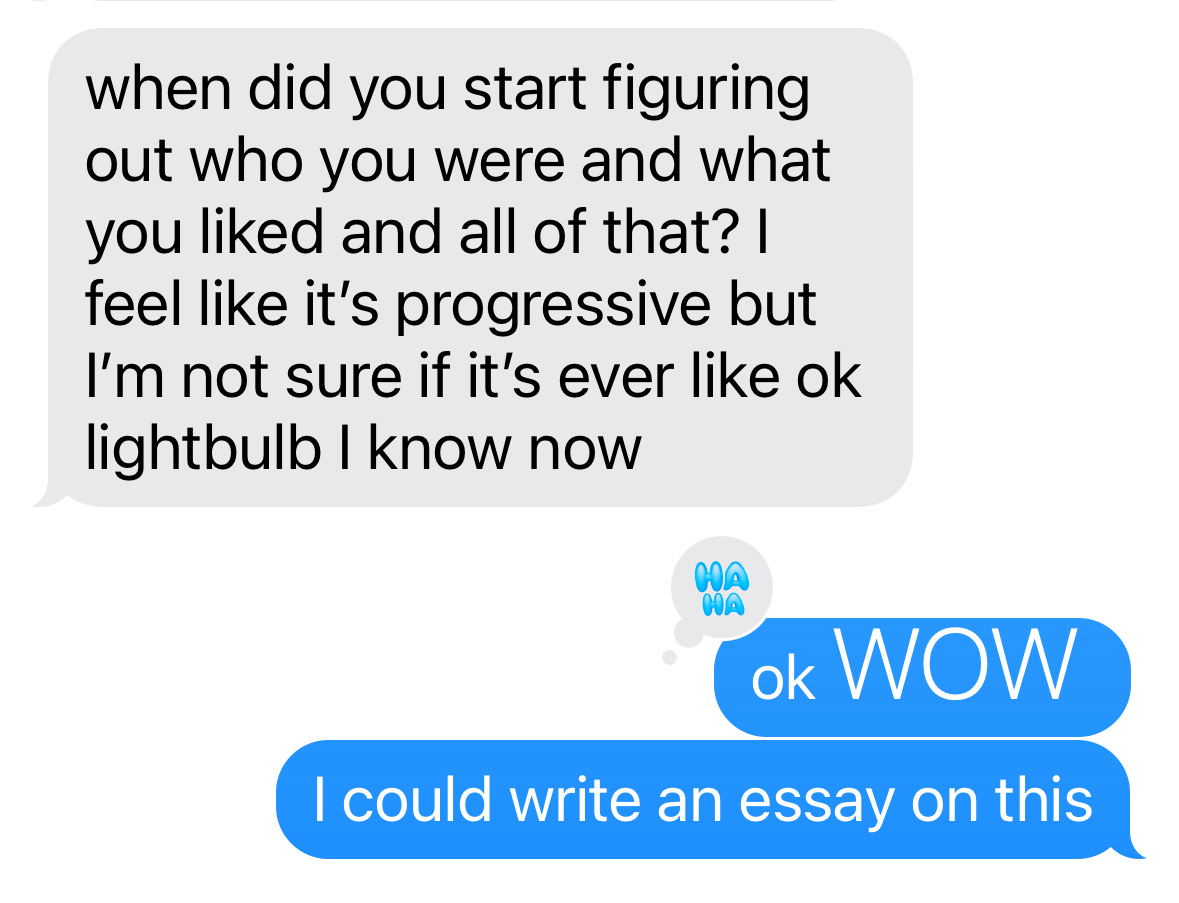Who We Are, What We Like, and Who We’ll Become
An investigation into one of life’s greatest mysteries - ourselves.
Recently, I received the following text from a friend:
This text obviously instigated about an hour of back-and-forth voice memos (the ones coming from my end accounted for probably 60% of that length). Lucky for me, I have my own platform in which I CAN write an essay on this subject, so here we are.
Surprise, surprise, this is something I reflect on quite a bit. When and where did my sense of self come from and arrive? When did I start curating my taste, my opinions, my boundaries, my goals? Did I notice them changing? Do I remember their origins? Do I feel fully formed? Am I proud of the identity I have created? Was this identity always predestined, or did nurture change it along the way? This text is an excellent way to sum up the decade of being twenty (hopefully, hopefully, this level of existentialism dies off in your thirties and beyond, but time will tell).
In order to do my diligence, I decided to crowdsource how the people around me felt about this question.




If we think of identity and tastes within the bigger picture, I’d argue that most of us did not have our own of either until at least college (most likely post-grad.) From our earliest years to adolescence, our sense of self is deeply informed and shaped by the communities around us. What TV shows our parents have on in the background when we got home from school, what our coaches and teachers imparted on us, what our friends believed (that was most likely regurgitated from their own families and networks, and so forth). Most of our sense of self was built around our insecurities of what and who we weren’t, and what we wanted to be instead. We were built off of what we lacked rather than what we had. What we identified in others as traits and qualities and interests and opinions as “cool” or “right” or “interesting”, and so we adopted them as our own. We all had a bit of cultural Stockholm Syndrome. I call these the years of identity by association.
Up until college, so much of my sense of self was built around how I perceived others to perceive me. I think this would shock most people I know, as I now have an incredibly strong sense of self and taste. I was loud, outgoing, funny, and sarcastic; thus, I remained loud, outgoing, funny, and sarcastic. I auditioned for the musical in the seventh grade because being in choir was cool, and there was a boy I had a crush on who was the lead (little did I know that boy was already taken, dating another boy at a different middle school. My gaydar needed some work.) If you’re lucky, maybe one day I’ll tell you the song I auditioned with. I liked being recognized as the one who always raised their hand in class, who loved being student body president (you can laugh out loud here), who was known within my family as the one who could hold a conversation with any adult. I pretended that nothing bothered me, and my skin was thick as could be. I pretended to like karaoke (this went on for many, many years until finally, at age twenty three I started admitting that it made me deeply depressed.) I pretended to like Death Cab for Cutie. I pretended to like drinking coffee. I had my own interests, sure, (reading and writing and cooking and eating - some things don’t change), but a majority of my life and how I defined myself was through the lens of what other people found impressive and valuable and worthwhile. I always loved to make people laugh because I loved knowing I could make somebody feel something, and that something they would remember positively. I remember being nineteen and visiting my friend who had an internship in New York City; I’ll never forget when she said to me, “Sydney, if you want to find a boyfriend, you need to stop being the funny one.” (Friend may be a loose term now that I think about it.) Although the approach here was completely incorrect and I have found many a man that appreciated a good sense of humor (including the one I’m marrying), the sentiment of perception and identification stuck with me. Had I been defining myself incorrectly all these years?
While in college, I started to try on different personalities. I reinvented, repeatedly. The cool, chill girl (does anything about me read as chill?), the creative writer and indie music lover (don’t like smoking weed), the serious academic (terrible at math unfortunately), the partying sorority girl (that one really only lasts as long as it lasts, you know what I mean?). Through all of these lenses, I started to see, for the first time, what it was like to be myself. I met myself, or the beginnings of myself, at least. I started to ask myself critical questions that I never had prior - it’s shocking how much time you have to analyze yourself when you’re not focused on placing full merit on how others perceive you. I liked the way I felt when I was making a group of people laugh (I wore my fair share of costumes out to frat houses), but I also liked how it felt to sit on someone’s couch and talk about the newest Fleet Foxes album. I liked how it felt to drink, dance, and get attention from men, but I also liked talking to my International Relations professor after class about the implications of the 2016 election. I liked how it felt to make friends who saw every piece and personality of you. I liked that I could exist under so many labels, that instead of picking one definition and sticking to it, I could be a bit of an enigma. Maybe all of my reinventions were experiments of self.
In your twenties (and again I state hopefully only in your twenties), figuring yourself out feels like trying to do a jigsaw puzzle where half the pieces are from someone else’s trauma and the other half keep changing shape. The pieces of yourself you were starting to learn from nineteen to twenty-two maybe don’t apply as well as they used to. You get brief flickers of “oh that’s me” when something clicks—an outfit that fits like a memory, recognition from someone you love, a hobby that doesn’t feel performative—but they’re gone just as fast.
Some people are born with an incredibly strong sense of who they are, and never have any issues or critical thoughts around identification. To those people, I say congratulations - you’ve avoided expensive therapy and many a sleepless night. I’m pretty sure every year of my twenties, post twenty-two, has been a reckoning. I can specifically recall moments where I did not recognize a single part of myself or my actions. Nothing felt like it fit; everything was too tight, too loose, too uncomfortable, too stuck. I can also recall moments where I never felt more positive than I was exactly who and what I am supposed to be. (Now, those moments are incredibly rare and elusive, so it’s best not to get too used to them.) In the past six months alone I’ve questioned and recalibrated and questioned and recalibrated eight hundred thousand times. Every time I’ve gotten to what I thought was the top of the mountain, I realized I’m not even close.
I don’t think we ever get a lightbulb moment. I think it’s more like one of those old-school motion-activated lamps. You get a few seconds of clarity, and then everything goes dark until you flail again. For the rest of us who have been on this path of exploration, I think we’re probably better for it. Well, hopefully we’re better for it. We’ve gotten the chance to dig deep, to get really uncomfortable, to think critically about ourselves and our lives and the way we want to move through the world.
To answer my friend’s initial question, wondering when they’ll know who they are once and for all, maybe don’t. Just keep paying attention. Know when the traits and armor, and identities that used to serve you don’t anymore. The things you love quietly, the things you defend irrationally, the things you mourn years later—those are all the pieces that make up the puzzle. Don’t hold on too tightly when you notice the puzzle changing and growing, and adapting as the years go on. Learn to let go and welcome the different. Maybe pieces start to fit together when they didn’t before; maybe you realize that you, too, hate karaoke. Let yourself be, give yourself grace. It’s all your you-ness. Even if it’s still very much under construction.






Always insightful! Love you’re evolving self.
Great writing!
Philosophy has a lot of the answers. What you told your friend is correct! Try on everything and when it doesn’t fit go to the next. Every decade comes with a new set of challenges. Just keep going!